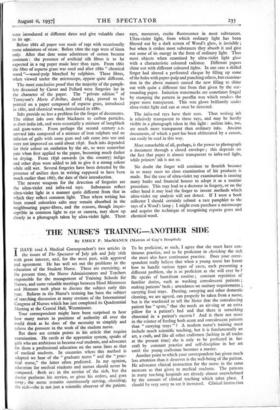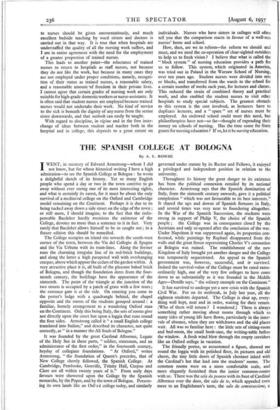THE NURSE'S TRAINING -ANOTHER SIDE
By EMILY P. MacMANUS (Matron of Guy's Hospital)
I HAVE read A Medical Correspondent's two articles in the issues of The Spectator of July 9th and July 16th with great interest, and, for the most part, with approval and agreement. He has well set out the problems in the education of the Student Nurse. These are exercising, at the present time, the Nurse Administrators and Teachers responsible for the management of Training Schools for Nurses, and some valuable meetings between Head Mistresses and Matrons took place to discuss the subject early this year. Reform in the Nurse's training has been the subject of searching discussion at many sessions of the International Congress of Nurses which has just completed its Quadrennial Meeting at the Central Hall, Westminster.
Your correspondent might have been surprised to hear how many nurses in positions of authority all over the world think as he does of the necessity to simplify and relieve the pressure in the work of the student nurse. But there are certain points in his article that require examination. He cavils at the apprentice system, speaks of girls who are ambitious to become real students; and advocates for them a professional education on the same lines as that of medical students. In countries where this method is adopted we hear of the " graduate nurse " and the " prac- tical nurse," the latter often preferred. In my opinion, education for medical students and nurses should never be compared. Both are in the service of the sick, but the doctor performs his service, or gives his orders, and goes away; the nurse remains continuously serving, cherishing, the sick—she is not just a scientific observer of the patient. To be proficient, as such, I agree that she must have con- tinuous practice, and to be proficient in cherishing the sick she must also have continuous practice. Does your corre- spondent really believe that when a young nurse has learnt how to handle various types of cases, each presenting a different problem, she is as proficient as she will ever be ? He speaks of humdrum routine ; constant repetition of familiar duties, such as washing convalescent patients ; making patients' beds ; attendance on sanitary requirements ; carrying food trays. Dusting, sweeping and other domestic cleaning, we are agreed, can properly be taken from a nurse, but is the wardmaid to tell the Sister that the convalescing patient has " spots," that she needs an air-ring or an extra pillow for a patient's bed and that there is something abnormal in a patient's excreta ? And is there not more in the science of feeding both acute and convalescent patients than " carrying trays " ? A modern nurse's training must include much scientific teaching, but it is fundamentally an art, a craft, and like all other craftsmen (lacking in all trades at the present time) she is only to be perfected in her craft by constant practice and self-discipline in her art until the young craftsman becomes a master. Another point to which your correspondent has given much less attention than it deserves is the well-being of the patient. He advocates clinical instruction for the nurse in the same measure as that given to medical students. The patients in many teaching hospitals are already almost overwhelmed by the amount of clinical teaching which takes place. I should be very sorry to see it increased. Clinical instruction to nurses should be given unostentatiously, and much excellent bedside teaching by ward sisters and doctors is carried out in that way. It is true that when hospitals are understaffed the quality of all the nursing work suffers, and I am in entire agreement with the need for the employment of a greater proportion of trained nurses.
This leads to another point—the reluctance of trained nurses to return to hospitals as staff nurses, not because they do not like the work, but because in many cases they are not employed under proper conditions, namely, recogni- tion of their status as trained nurses, a reasonable salary, and a reasonable amount 'of freedom in their private lives. I cannot agree that certain grades of nursing work are only suitable for high-grade domestic workers or nurse-assistants. It is often said that student nurses are employed because trained nurses would not undertake their work. No kind of service to the sick is beneath the dignity of any nurse from the senior sister downwards, and that outlook can easily be taught.
With regard to discipline, in regime and in the free inter- change of ideas between student and teacher both in the hospital and in college, this depends to a great extent on individuals. Nurses who have sisters in colleges will often tell you that the comparison reacts in favour of a well-run nurses' home and school.
How, then, are we to reform—for reform we should and must, and we need the co-operation of clear-sighted outsiders to help us to fresh vision ? I believe that what is called the " block system " of nursing education provides a path for us to follow. This system, which originated in America, was tried out in Poland in the Warsaw School of Nursing, over ten years ago. Student nurses were divided into sets or blocks, and transferred from the wards to the school for a certain number of weeks each year, for lectures and classes. This reduced the strain of combined theory and practical work, and also enabled the student nurses to visit other hospitals to study special subjects. The greatest obstacle to this system is the cost involved, as lecturers have to duplicate lectures, and a " spare " set of nurses must be employed. An endowed school could meet this need, but philanthropists have not—so far—thought of expending their money on schools of nursing. Has the time come for State grants for nursing education ? If so, let it be nursing education.







































 Previous page
Previous page